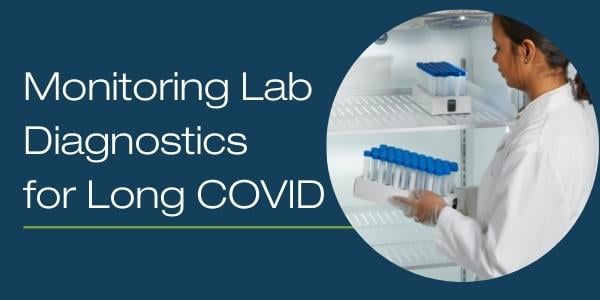Most people with COVID-19 recover within weeks of becoming infected, however, some individuals may develop post-COVID conditions. These are a wide range of new, returning, or ongoing health problems experienced more than four weeks after first being infected with SARS-CoV-2. According to the CDC, even people who did not have COVID-19 symptoms in the days or weeks after contracting the virus can develop post-COVID conditions, which present as different types and combinations of health issues for various lengths of time.
Post-COVID conditions may also be known as long COVID, long-haul COVID, post-acute COVID-19, long-term effects of COVID, or chronic COVID. The term “long hauler” is commonly used to describe patients suffering from the effects of long COVID. The CDC and experts around the world are working to learn more about short- and long-term health effects associated with COVID-19, who gets them, and why.
Clinical Lab Products (CLP) magazine published an article discussing the role of laboratory diagnostics post-COVID. It explains long COVID does not appear to correlate with the severity of illness, and the condition can affect multiple organ systems. Patients report a wide range of symptoms. Because the range of symptoms is so variable, it can be difficult to diagnose long-haulers.
“Just as laboratory testing was critical in helping to accurately diagnose acute COVID, lab testing is likely to play an ever increasingly important role in objectively diagnosing, characterizing, and identifying the cause of chronic COVID, as well as providing a path toward a more precision medicine approach to treatment,” the article said.
Clinical lab testing for chronic COVID includes a range of assays, as well as an approach that identifies and characterizes immunological abnormalities. Identifying which biomarkers are out of normal range can provide guidance as to which drugs may be useful for effective treatment.
To run diagnostic tests, clinical laboratories must store temperature-sensitive patient specimens and reagents. To ensure accurate test results (and reduce the risk of financial loss due to temperature excursions), it is important to use refrigeration designed for this purpose. Laboratories may want to know more about what makes certain cold storage units suitable for storing samples and reagents, and how these units can help ensure the lab is meeting the requirements of accrediting agencies.
Other Blogs You Might Be Interested In...
- Supporting Sustainability Initiatives with Temperature-Controlled Storage
- Medical-Grade Refrigeration in Clinical Lab: Trends and Adoption Rate
- Healthcare Systems Consider Impact of Climate Change
- GX Solutions Freezers Receive ENERGY STAR® Recognition
To answer questions about what is important in the design of a laboratory refrigerator, Helmer has developed a Best Practices Guide for Selecting Laboratory Refrigerators. It includes specific College of American Pathologists (CAP) checklist requirements and considerations for implementation. It also clarifies how the design of a laboratory refrigerator can help clinical laboratories comply with requirements and facilitate best practices in an easy-to-use checklist format.





